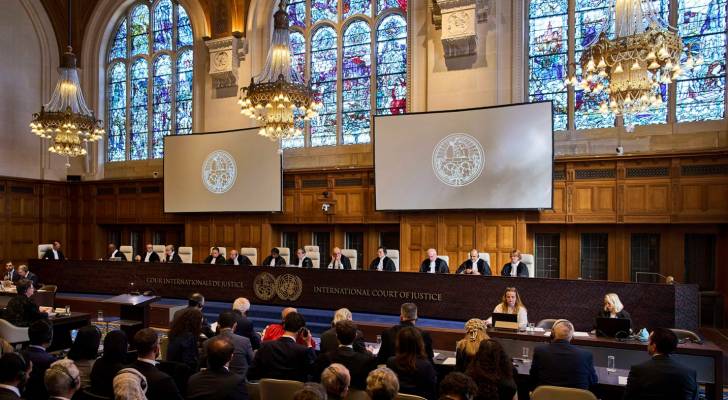'Israel' not obliged to allow Gaza aid, US tells ICJ
On April 30, 2025, the United States presented its oral arguments before the International Court of Justice (ICJ) in The Hague during hearings on 'Israel’s' legal obligations to ensure humanitarian aid reaches Palestinian civilians in Gaza and the occupied West Bank.
The US position, articulated by envoy Joshua Simmons, sparked controversy for asserting that international law does not compel an occupying power, such as 'Israel', to facilitate humanitarian aid, while deflecting responsibility onto Hamas and questioning the neutrality of the UN Relief and Works Agency (UNRWA).
Context of the Hearings
The ICJ hearings, held from April 28 to May 2, 2025, were prompted by a December 2024 UN General Assembly resolution requesting an advisory opinion on 'Israel’s' responsibilities under international law to allow unhindered humanitarian assistance to Palestinians.
The resolution followed 'Israel’s' near-total blockade of Gaza since March 2, 2025, which halted food, medicine, and fuel deliveries, plunging the region into famine-like conditions. Over 40 states and international organizations participated, with the US joining Russia, France, Hungary, and Indonesia in presenting statements on April 30.
The US argument: Key points
The US delegation, led by Joshua Simmons, made the following claims during the ICJ session:
No legal obligation for 'Israel' to facilitate aid:
Joshua Simmons argued that international humanitarian law does not impose a duty on an occupying power, such as 'Israel', to allow or facilitate humanitarian aid to occupied territories like Gaza.
He claimed that the Fourth Geneva Convention and other legal frameworks do not explicitly mandate such actions, particularly when neutrality in aid distribution cannot be guaranteed. This position stunned legal observers, with critics like Heidi Matthews calling it “legally incoherent” and akin to “malpractice.”
Concerns over UNRWA’s neutrality:
The U.S. says an occupier can determine which relief schemes it agrees to. It says an occupier can fulfill its obligations while advancing its military & security interests considering the relevant circumstances. *None of this means an occupier can intentionally obstruct aid to…
— Heidi Matthews (@Heidi__Matthews) April 30, 2025
The US raised doubts about the impartiality of UNRWA, the primary UN agency delivering aid to Gaza. Joshua Simmons echoed 'Israeli' allegations that UNRWA is infiltrated by Hamas, citing unverified claims that some staff members participated in the October 7, 2023, attack. He suggested that this perceived lack of neutrality justifies 'Israel’s' restrictions on UNRWA operations, including its January 2025 ban from operating within 'Israel'.
Blaming Hamas for aid blockages:
Joshua Simmons attributed Gaza’s humanitarian crisis to Hamas, alleging the group diverts aid for military purposes. He argued that 'Israel’s' blockade is a lawful response to prevent resources from reaching Hamas, despite evidence from the World Food Programme and Amnesty International showing that 'Israel’s' restrictions have caused widespread starvation. The US position sidestepped 'Israel’s' control over Gaza’s borders and crossings, which effectively throttles aid delivery.
Neutrality as a legal prerequisite:
The US claimed that international law requires humanitarian aid operations to maintain strict neutrality. Joshua Simmons argued that the absence of neutral aid distribution mechanisms in Gaza relieves 'Israel' of any obligation to cooperate with UN agencies. This assertion ignores the dire conditions faced by civilians, with over 2.1million Palestinians struggling to access food and water.
Defense of 'Israel’s' actions as potentially lawful:
Joshua Simmons defended 'Israel’s' attacks on UN facilities and personnel in Gaza as potentially lawful, provided they comply with principles of distinction and proportionality under international humanitarian law.
The US arguement focused on UNRWA’s alleged bias relies on unproven 'Israeli' claims, dismissed by UN investigations as lacking corroborated evidence. By scapegoating Hamas, the US ignores 'Israel’s' documented obstruction of aid, including the closure of Rafah and Kerem Shalom crossings, which has left thousands of aid trucks stranded. The argument also sidesteps the US’s own role, as a major supplier of military aid to 'Israel', in enabling the blockade and ongoing conflict.




